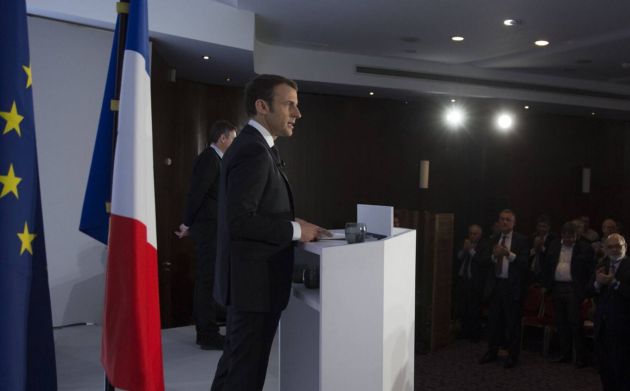-
 From nice story to pulped fiction: Carney delivers reality check on rules-based order
From nice story to pulped fiction: Carney delivers reality check on rules-based order
-
 Record bonds, rising bills: Greece’s economic paradox
Record bonds, rising bills: Greece’s economic paradox
-
 Podcast - Tax cuts and balancing acts: Greece's 2026 budget
Podcast - Tax cuts and balancing acts: Greece's 2026 budget
-
 Podcast - Main character energy: Greece vies for leading fossil fuel role
Podcast - Main character energy: Greece vies for leading fossil fuel role
-
 15% Uncertainty: Greece, Europe and the tariff shockwave
15% Uncertainty: Greece, Europe and the tariff shockwave
-
 Summit of transactions – Erdogan and Trump
Summit of transactions – Erdogan and Trump
No honeymoon for Macron

Emmanuel Macron does not have a lot of time for celebrations after winning the second round of the presidential election on Sunday. Never has an incoming president had to confront a higher level of public disaffection, a political cynicism only exacerbated by a bruising campaign with little real discussion about policy. Even more importantly, Macron’s victory was not the result of a resounding endorsement of his ideas by the electorate. Rather, a majority of voters mobilised in his favour in order to block far-right doyenne Marine Le Pen from the presidency.
This means that the former economy minister will face two significant tasks during the first 100 days of his term. The first one will be to build political alliances in order to be able to govern. His choice of prime minister shortly after he is sworn in will be highly symbolic in this regard. Appointing a well-established politician from the centre-right could signal Macron’s willingness to build bridges across the political spectrum, but this could also earn him accusations of not fulfilling his promise of political renewal at the helm of government. Macron’s ability to implement his agenda will also be heavily dependent on the result of the mid-June legislative elections. In principle, his “En Marche” movement is well-placed to win a significant number of MPs. But EM remains an untested political force and if it falls short of an absolute majority, Macron will have to engage in tough negotiations to form a workable parliamentary majority.
The second task will be to prove to French voters as quickly as possible that he can actually deliver change, both on the political and the economic fronts. Macron will likely move fast to introduce a law to “moralise” politics, for instance by limiting the privileges of MPs. But this will be a walk in the park compared to what promises to be the flagship project of Macron’s presidency: labour reform. For the centrist politician, liberalising the labour market is a crucial – almost existential – endeavour if French unemployment is to be substantially reduced. Yet, he is likely to face the ferocious resistance of the extreme left – led by Jean-Luc Melenchon – and some trade unions. They perceive Macron’s labour plans as the big battle of the next “Quinquennat”.
In sum, the challenges are enormous. To be sure, the young politician might be the perfect candidate for the job: his knowledge of policy issues is deep, his sense of authority strong, and his negotiation skills are questioned by few. But as Franz Kafka famously said, “in a man’s struggle against the world, bet on the world”. Macron surely hopes he can prove the legendary writer wrong.
*Antonio Barroso is Deputy Director of Research at Teneo Intelligence, a political risk advisory firm. You can follow him on Twitter: @abarrous
An earlier version of this article appeared in Greek in Kathimerini.